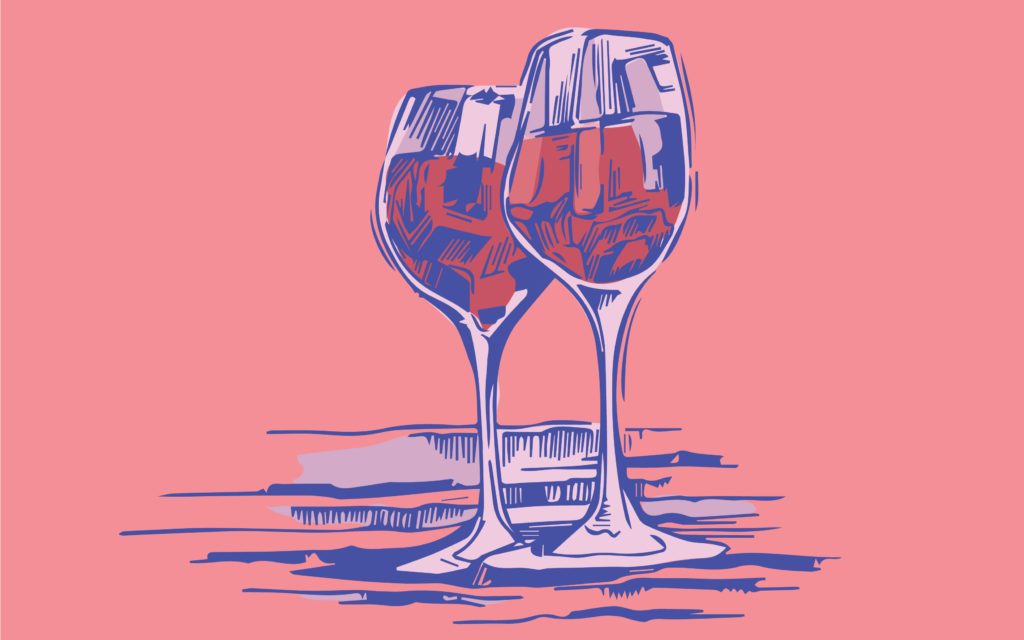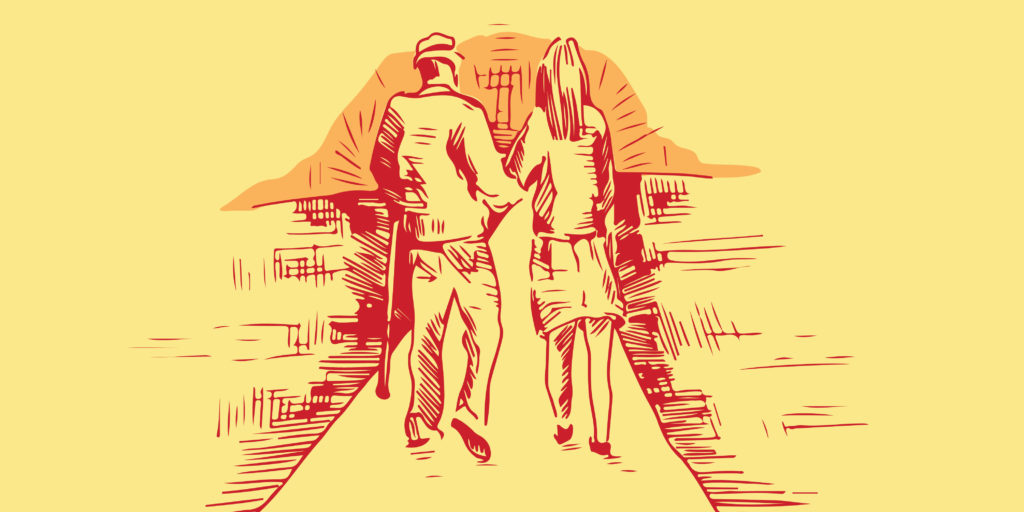Since childhood, my father had longed to stand on the spot where his father had been wounded as an American soldier in World War One. Family legend told of the weeks when my grandfather had been reported dead, followed by news of his presence in a rural French hospital, and finally the long struggle to bring him home.
It was my sister’s idea to make Dad’s dream come true. In the aftermath of my mother’s death, she felt it would draw the three of us together, and that it would keep my dad going a little longer. She had always been the organizer in the family, the listmaker, the one who barked directions at cab drivers. Now she would lead us through London, Paris, the Somme Valley, and a few square miles of wooded terrain near the Ourcq River, not far from the village of Chateau Thierry.
Dad was easily confused in those days and slow to move. Crowds on the London Tube left him paralyzed with confusion. Sheryl and I developed block-and-tackle moves to keep him close in commuter crowds, and only relaxed when he was asleep at the hotel or slumped in a train seat. When Dad watched me nose our rental car into Parisian traffic, he communicated his fear in a series of nervous, bird-like cries. Sheryl, on the other hand, had a sharp eye and a quick tongue. Far from a back-seat driver, she sat beside me as an equal, my partner in crime. “On the right,” she would announce firmly. Or, faced with a roundabout of careening mini’s, “Okay . . . now!”
Sheryl and I were never entirely estranged but our relationship had been rocky in the early years of adulthood. I had been judgmental of an early marriage. She had been embarrassed by my homosexuality. My life’s work was liberal-based and focused on experiencing the world through art and sentiment. She was the vice president of a small, profit-centric company where she earned the title Ax Woman because of her skill at terminating employment.
It was she, though, who bridged the gap between us. She sent her daughters to me as soon as they were old enough to travel, so they could experience East Coast culture and the home life of gay partners. When her work dictated frequent trips to Washington, D.C., we had the chance to get re-acquainted, becoming regulars at my neighborhood pub where she and the waiters mocked me in happy collusion.
Now, from Paris, we sallied forth together, to accomplish the true mission of our journey.
•
I had found Gilles Lagin on the internet. An expert guide, he would take us to the places where my grandfather had fought. He met us at the Montreuil Aux Lions exit, off the A4, about an hour from Paris. We chatted briefly then followed his ancient Mercedes to key locations along Company C’s advance between July 26 and 29, 1918; from the Bois de Fere to the Croix Rouge Farm, and on to the Ourcq River where the Americans were to take Hill 212 from the Germans.
At our first stop, we walked into a thin line of trees at the edge of a thick wood. Lagin pointed to the shallow fox holes full of autumn leaves. “Here,” he said, “is where your grandfather is laying in the earth.” He looked at Dad. “Your father.”
He pointed across an open field. “There, in those trees, are the Germans. He crosses from here to there and they are shooting at him with machine guns.”
Throughout my youth, Grandpa had talked about the glory of fighting in what had been called the Great War and, naively, the War to End All Wars. His experiences on the battlefields of France were part of a family legacy that reached back to the doctor who served on George Washington’s staff and a Union soldier whose papers list the legendary battles of Antietam, Gettysburg, and Chancellorsville. Dad played his own part in that legacy. A Navy man, he sailed the Pacific just after the Korean War, so never saw active duty. He grew up on his father’s stories and, I expect, feared he would never live up to them.
My own admiration for Grandpa grew during his final years. His mind had started to fail but with that deterioration came a new honesty. On his last Thanksgiving, we had some time alone and he shared more deeply about his experiences in those fields near Chateau Thierry. He told me of emerging from that same line of trees at the edge of that thick wood. He spoke of crossing the field under machine-gun fire, of glancing to his right, and seeing his best friend’s head blown away.
“Never go to war,” he told me, wiping away tears. “No matter what they say.”
•
A short drive brought us to the banks of the Ourcq, little more than a stream running along the base of Hill 212.
“This is the spot,” Dad said. “This is what he described.” He glanced up the steep slope of the hill. “That.” And across the rising field. “And that. Even the fence.”
Lagin joined us. “The Germans,” he said, “are up there, firing down on him.” He pointed to a small farm, half a mile away. “The medics take him there, for first aid, under fire. The buildings are the same. Then they take him by ambulance, there.” He pointed up a sloping valley and to the hills beyond.
Sheryl, Dad, and I knew what followed. Grandpa was taken by train to Lyon, far from the front. My great-grandfather, back in Iowa, reached out to his representatives in Congress to get news of his boy and, eventually, to bring him home. He was waiting on the dock in New York when the ship arrived with his son on board. Grandpa’s discharge papers, which I have, state that he was in “poor” condition. Under “Remarks,” they state simply “Services honest and faithful.”
Standing above the Ourq, Dad was shaken. He was prone to tears in his later years, even before my mother’s death. I had worried that he would break down, that perhaps we should make this pilgrimage alone, so we’d have some privacy. But Lagin was a godsend. He smiled at my father’s emotion and then looked away, scanning the earth.
“The farmers are very careful around here. Their plows sometimes bring up shells or bodies.”
He found an empty shell case near the stream.
“You see,” he said. “The war is still with us.”
For Dad, the rest of the trip was without purpose, but he soldiered on. We walked the stone aisles of the cathedral at Reims, strolled along trenches now softened by green turf, and toured cemeteries and museums. Sheryl had thoughts of becoming a vineyard manager back home in California so we toured champagne houses and wineries. We did it all for Dad but our happiest moments came when he had gone to bed and we could share a quiet glass of wine in the hotel bar. We didn’t know that Sheryl’s dreams of a second career could not be realized because of the melanoma already working in her system. My father would survive our trip by a year, and my sister by two.

•
We were back in Paris, walking up the Rue des Halles to our hotel, when Sheryl looked over Dad’s head and said to me, “Get out of here.”
The day at Versailles had been a long one. I had wanted to submerge myself in history, to imagine panniers and pantaloons. Instead, we had worked together just to keep Dad on his feet. I was depleted, self-pitying. I wanted nothing more than to be alone.
“I’ll get Dad to the hotel and put him down for a nap,” she said.
“Are you sure?”
“What’s happening?” Dad asked.
The trip that he inspired had become an unexpected gift, bringing his children closer than they had ever been. It was a gift that would give me considerable pain when I found myself in Sheryl’s living room, listening to family and strangers share stories about her life. The tales I wanted to tell — of Paris, of the Ourcq — should have been told in tandem as we argued over conflicting memories. They should have been distorted and refined over the years until the words “Remember the time . . .” would cause adult grandchildren to roll their eyes.
“Norm’s taking off,” she said to Dad. “You and I are going back to the hotel.”
She gave me a sharp look that didn’t allow for discussion. “I’ll meet you behind Notre Dame in an hour. Do you have your journal?”
I nodded, then stopped where I was, and watched them move away together. •




